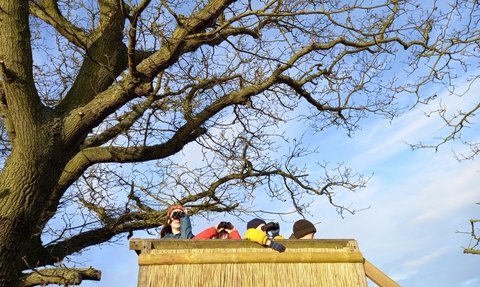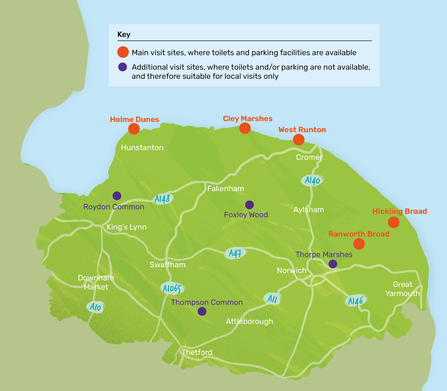
Birdwatching at Hickling (credit: NWT)
Youth groups
Skip to:
We manage some of the most inspiring wild spaces in the county. Part of our vision is to reconnect people of all ages with wildlife. Our experienced Wilder Learning Officers deliver a range of sessions which inspire children and young people to discover, explore and care for our precious natural world through hands-on, engaging sessions.
Our youth group sessions are suitable for informal and uniformed youth groups, such as Brownies and Scouts, as well as home education groups.
You can either choose to visit us or we can visit you. So, get ready for a wilder learning experience!
You visit us
Our teams can't wait to welcome you to our sites and share the wonderful wildlife of Norfolk. We have lots of different sessions available at each of our visit locations.
Please note: only certain locations have facilities – you may need to consider this when booking your visit.

Discover and Learn map 2024
Activities at our sites
Your site visit will begin with a short introduction, followed by the different activities you have selected for your visit. Each session lasts approximately 1 hour.
Brilliant birds
This is a wonderful opportunity to observe and learn about the spectacular variety of birds found in Norfolk from our bird hides. Pupils will identify and compare different species, and how they are adapted to their environment.
Available at: NWT Cley Marshes, NWT Hickling Broad, NWT Holme Dunes, NWT Ranworth Broad
Key words: Adaptation, behaviour, species, migration, prey, predator
Broads boat trip
Experience wetland habitats from a unique perspective. Our knowledgeable boat operators will provide a brief history of the Norfolk Broads, and what makes them so special to our wildlife today.
Available at: NWT Hickling Broad, NWT Ranworth Broad
Key words: Habitat, species, ecosystem, peat, conservation, management, food chain
Changing coastlines
An interactive session that explores the coastal environment. Young people will act out and explore the roles of waves, erosion, and sea defences to understand how the sea affects both landscape and people.
Available at: NWT Cley Marshes, NWT Holme Dunes, West Runton Beach
Key words: Erosion, longshore drift, sea defence, coastal processes
Dyke dipping
Explore the freshwater life at our reserves. Young people will learn about freshwater invertebrates through dipping in the dykes and using keys to identify their finds.
Available at: NWT Cley Marshes, NWT Hickling Broad, NWT Ranworth Broad
Key words: Freshwater, habitat, invertebrate, life cycle, food chain, prey, predator, biodiversity
Environmental games
Young people are encouraged to use their senses and their imagination to learn about the natural world through play. Games can be either terrestrial or marine themed.
Available at: NWT Cley Marshes, NWT Foxley Wood, NWT Hickling Broad, NWT Holme Dunes, NWT Ranworth Broad, NWT Roydon Common, West Runton Beach
Key words: Adaptation, behaviour, echolocation, predator, prey
Fascinating fossils
Explore the fascinating ancient history of the beach and geology at West Runton. Young people will learn how the climate and creatures have changed over time. They will have the opportunity to handle our fossil collection and learn what to look out for when searching for fossils.
Available at: West Runton Beach
Key words: Geology, erosion, evolution, adaptation, extinction
Habitat trail
An interactive introduction to the diverse habitats and species we manage our sites for. Young people will explore and immerse themselves in the natural world using their senses on a tour of the nature reserve.
Available at: NWT Cley Marshes, NWT Foxley Wood, NWT Hickling Broad, NWT Holme Dunes, NWT Roydon Common, NWT Ranworth Broad, NWT Thompson Common, NWT Thorpe Marshes
Key words: Habitat, adaptation, behaviour, species, life cycle, camouflage, prey, predator, conservation, biodiversity
Miraculous minibeasts
A chance for young people to investigate the fascinating world of terrestrial invertebrates, using the techniques and equipment scientists use. Pupils will be encouraged to empathise with other organisms and understand the importance of every species.
Available at: NWT Foxley Wood, NWT Hickling Broad, NWT Holme Dunes, NWT Ranworth Broad, NWT Roydon Common, NWT Thompson Common, NWT Thorpe Marshes
Key words: Habitat, food chain, ecosystem, species, life cycle, camouflage, prey, predator, biodiversity, pollination, decomposers
Plant detectives
Discover the extraordinary lives of plants by exploring their life cycles and how species vary between habitats within the local environment. Young people will identify the many things plants do for us and learn how important biodiversity is to our lives.
Available at: NWT Hickling Broad, NWT Holme Dunes, NWT Ranworth Broad
Key words: Habitat, life cycle, adaptation, seed dispersal, pollination, biodiversity
Rockpool rummaging
This session explores the rare rockpool habitat and dependent rocky shore species at West Runton. Young people will learn how species have adapted to live in the sea and on land in one of the harshest and most changeable habitats.
Available at: West Runton Beach
Key words: Habitat, adaptation, camouflage, predator, prey, sustainability, biodiversity, life cycle, North Sea
Self-guided
Youth group leaders lead this session. This session can be incorporated as part of a visit with other NWT-led sessions.
Available at: NWT Cley Marshes, NWT Foxley Wood, NWT Hickling Broad, NWT Holme Dunes, NWT Roydon Common, NWT Ranworth Broad, NWT Thompson Common, NWT Thorpe Marshes
Nature detectives
Young people get to see our box of natural history treasures and learn about the animals they belong to, before investigating their own surroundings for evidence of wildlife. Depending on the number of young people and notice provided, this session can also incorporate owl pellet dissection.
Available at: NWT Cley Marshes, NWT Hickling Broad
Key words: Habitat, adaptation, mammals, invertebrates, species, life cycle, camouflage, prey, predator, hibernation, identification, conservation, biodiversity
Wild art
Wild art is inspired by the work of artists, such as Andy Goldsworthy, who create pieces in the landscape using natural materials. Young people will explore the concept of sustainability and create their own temporary artworks made from found natural materials, with habitats and wildlife as their inspiration and background.
Available at: NWT Cley Marshes, NWT Hickling Broad, NWT Holme Dunes, NWT Roydon Common, NWT Ranworth Broad, NWT Thorpe Marshes, West Runton Beach
Key words: Sustainability, habitat, texture, conservation, species, materials
Young person birdwatching at Hickling (credit: Meg Watts)
We visit you
The day usually starts with a brief introduction, before going on to do the sessions you have selected from the list below. Please note: depending on the session, it may be useful to have an outdoor space, e.g. for 'Pollinator power'.
Environmental games
A session full of different games, designed for children to use their senses and their imagination to learn about wildlife diversity and adaptations through play.
Key words: Adaptation, behaviour, echolocation, predator, prey
Fascinating fossils
An adapted, hands-on version of our popular West Runton-based fossils workshop. This session will explore how fossils are formed, what they tell us about our past, and why Norfolk is such a special place for fossil hunting. As part of the session, we’ll bring along our impressive fossil collection for the children to look at.
Key words: Geology, erosion, evolution, adaptation, extinction
Lost words
'The Lost Words' book by Robert Macfarlane and Jackie Morris celebrates nature words, such as acorn, willow and kingfisher, which were more commonly used in the past. Using the book as inspiration, we encourage children to explore creative writing through nature exploration word games and wild art activities.
Key words: Verb, adjective, adverb, simile, metaphor, creative expression
Magical marine
A session focusing on our special North Sea habitats and wildlife. Children will explore the species diversity and the challenges for our marine wildlife through real artefacts, thought-provoking activities and games.
Key words: Habitat, North Sea, adaptation, camouflage, predator, prey, sustainability, biodiversity, life cycle
Nature detectives
Young people get to see our box of natural history treasures, and learn about the animals they belong to, before investigating their own surroundings for evidence of wildlife. Depending on the number of children and notice provided, this session can also incorporate owl pellet dissection.
Key words: Habitat, adaptation, mammals, invertebrates, species, life cycle, camouflage, prey, predator, hibernation, identification, conservation, biodiversity
Pollinator power
A session which champions our small but mighty minibeasts! Children will investigate what invertebrates exist in their group's setting and take part in games and activities to learn about the importance of pollination and what we can do to help our pollinators.
Key words: Habitat, food chain, ecosystem, species, life cycle, camouflage, pollination, decomposers, prey, predator, biodiversity
Wild art
A session which encourages young people to take a closer look at their environment and engage with it creatively; to see colours, shapes and textures, in their group's setting and create ephemeral works of art using natural materials.
Key words: Sustainability, habitat, texture, materials, conservation, species
Owl pellet dissection (credit: NWT)
Costs
Please be aware that the minimum number of children for all NWT guided and outreach visits is 10. Accompanying youth group staff go free of charge.
| Groups (home education, youth and uniform groups) | Cost |
|---|---|
|
You visit us* *Costs only applicable to main visit sites. Booking is essential for all types of visit. |
£3 + VAT per child per session (boat trip £5 + VAT) Minimum charge for NWT guided visit = £60 + VAT
Self-guided reserve visit = £1 + VAT per child/young person Boat trip + self-guided reserve visit = £6 + VAT per child/young person |
| We visit you |
Half day = £60 + VAT Full day = £100 + VAT |
Book now
Thank you for your interest in booking a visit with us!
We are fully booked for the remainder of the academic year, however if you are interested in a visit from September 2025 onwards, please complete a booking form, and we’ll get back to you as soon as possible.
If you have any queries about booking a visit, please email us at educationenquiries@norfolkwildlifetrust.org.uk
